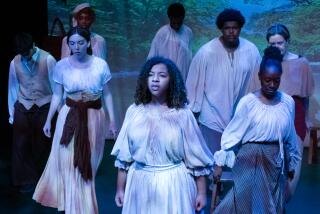Appreciating Characters’ Nobility in ‘Arms’
- Share via
The discrepancy between what theater critic Laurie Winer expressed about my play, “To Take Arms,” and what the majority of the audience, both black and white, is expressing, amazes me (“ ‘To Take Arms’ Struggles to Find Real-Life Drama,” Feb. 11).
But I understand Winer’s confusion. She thought the play was about oppression, about the humanity of the slaves vs. the inhumanity of the slave owners, because that is what plays set in the antebellum South with slaves in them are usually about. And the white characters are usually the central ones, and so Winer focused immediately on the white characters, even though they are minor in my play and appear only in a few of the scenes.
Winer says that the humanity of the slave is a given. I used to think that, too. Would that it were!
A black woman expressed to me her deep appreciation for my play because, she said, it celebrates who the blacks of today really are: “the sons and daughters of nobility.” For what these antebellum black women demonstrated, which I have now dramatized, is nobility of character. As to Winer’s dismissal of this play as “melodramatic,” this same black woman expounded: “All black lives are melodramatic.”
This country, in my opinion, has yet to come to terms with the nobility of character the American blacks have shown in the face of the deplorable things that continue to be done to them. That’s what my play ultimately is all about.
And I am deeply gratified that the audience, for the most part, seems to understand that.
SUSAN FLAKES
Whittier
More to Read
The biggest entertainment stories
Get our big stories about Hollywood, film, television, music, arts, culture and more right in your inbox as soon as they publish.
You may occasionally receive promotional content from the Los Angeles Times.










